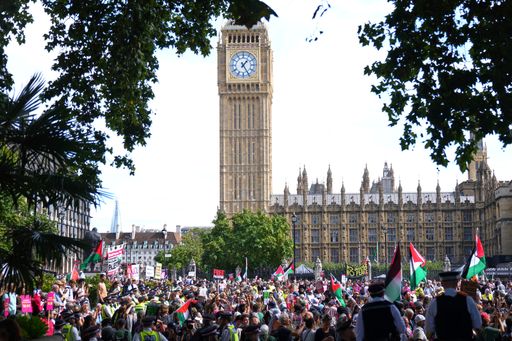Britain, Canada and Australia recognised a Palestinian state on Sunday in a coordinated move borne out of frustration over Israel’s war on Gaza and intended to promote a two-state solution, inviting anger across Israel.
In a statement, the Israeli Foreign Ministry called the recognition “nothing but a reward for jihadist Hamas.”
Israeli Prime Minister Benjamin Netanyahu said Israel's response will be announced when he returns from the United States, where he is scheduled to meet President Donald Trump.
"And I have another message for you: It will not happen. A Palestinian state will not be established west of the Jordan River," he noted in a statement.
His far-right allies pressed for immediate action.
Far-right National Security Minister Itamar Ben-Gvir called on the Israeli government to annex the occupied West Bank and push through “a complete crushing of the Palestinian Authority.”
Writing on X, Ben-Gvir added that he would submit a proposal for West Bank annexation at the upcoming cabinet meeting.
Extremist Finance Minister Bezalel Smotrich also weighed in by declaring that foreign governments had no say over Israel’s future.
“The days when Britain and other countries would determine our future are over, the mandate is over, and the only answer to the anti-Israeli move is sovereignty over the homeland of the Jewish people in Judea and Samaria (occupied West Bank) and removing the foolish idea of a Palestinian state from the agenda forever,” he said.

Opposition leaders blame Netanyahu
Israeli Opposition Leader Yair Lapid said in a post on X that the “unilateral” recognition of a Palestinian state was a reward for terrorism, but also put some of the blame on the Netanyahu government.
“A functioning Israeli government could have prevented this through professional diplomatic dialogue and proper diplomacy.”
“The government that brought upon us the worst security disaster in our history is now also bringing upon us the most severe diplomatic crisis,” he said.
Yair Golan, head of the opposition Democrats Party and a former deputy chief of Israeli forces, also described the recognition of Palestinian statehood as “a severe political failure of (Prime Minister Benjamin) Netanyahu and (Finance Minister Bezalel) Smotrich — a destructive move for Israel’s security.”
“This is a direct result of Netanyahu’s political abandonment: refusal to end the war and the dangerous choice of occupation and annexation,” Golan said, calling for a stronger political stance to end Israel’s war on Gaza.
RelatedTRT World - Israel's opposition leaders unite in new forum to plan post-Netanyahu future
Critics abroad
In the UK, Opposition Leader Kemi Badenoch condemned the government’s decision, calling it “a reward for terrorism.”
Writing on X, she said: “We will all rue the day this decision was made. Rewarding terrorism with no conditions whatsoever put in place for Hamas. It leaves hostages languishing in Gaza and does nothing to stop the suffering of innocent people caught in this war.”
From Washington, US Secretary of State Marco Rubio said the Trump administration had “warned” European governments about recognising Palestine, cautioning that they could face a harsh Israeli response.
Rubio added that the US would not intervene to block any Israeli annexation moves on the occupied West Bank and argued that recognition “makes it harder to reach a peace agreement in Gaza.”

More countries to recognise Palestine
Since its declaration of independence on 15 November 1988, Palestine has been recognised by 147 of the UN’s 193 member states, with Ireland, Spain and Norway having formalised recognition last year.
That figure is expected to climb to 157 as several other countries, including Belgium, France and Portugal, are expected to formally recognise the Palestinian state at the UN General Assembly this week.
UN investigators recently concluded that Israel is committing genocide in Gaza, where more than 65,000 people have been killed since October 2023.




















